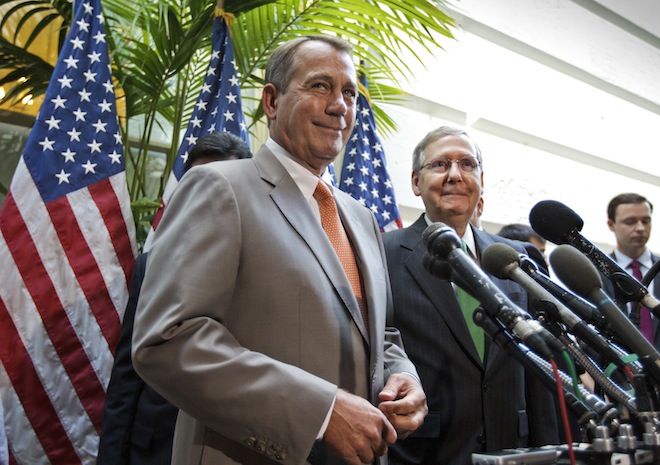After House Republicans conceded on Tuesday that they would bring a debt ceiling bill to the floor for a vote without attaching policy concessions, the tea party seemed in open revolt, calling for the replacement of Speaker John Boehner (R-OH). Meanwhile, incumbent Republican senators have quietly been working behind the scenes to cut off their funding sources.
“I’ve been told by a number of donors to our ‘super PAC’ that they’ve received calls from senior Republican senators,” FreedomWorks President and CEO Matt Kibbe told The New York Times. Those donors would then say to FreedomWorks, per Kibbe, that “‘I can’t give to you because I’ve been told I won’t have access to Republican leadership.'”
It was a sentiment echoed by The Madison Project’s policy director Daniel Horowitz to TPM on Tuesday: “It’s almost as if McConnell and his allies are acting like the IRS with intimidation.”
When asked if they’d experienced a similar phenomenon to FredomWorks, Horowitz replied, “I’m sure they tried. Our model never relied upon big donors who are well connected to the D.C. political establishment.”
Conservative groups have thrown a lot at the establishment in return. On Tuesday, after every single attempt to exact policy concessions from Democrats over the debt ceiling, conservative groups Club For Growth and the Senate Conservatives Fund immediately rallied their supporters.
“These leaders have telegraphed weakness to the Democrats and sabotaged conservative efforts so many times that Republicans now have no leverage. There’s only one solution,” SCF Executive Director Matt Hoskins wrote in an email to supporters. “John Boehner must be replaced as Speaker of the House.”
Club For Growth also blasted out, “Something is very wrong with House leadership, or with the Republican Party. This is not a bill that advocates of limited government should schedule or support.”
Outside conservative groups have proven an increasingly painful thorn in the paws of establishment congressional leadership and incumbent GOP lawmakers in the 2014 election cycle. These groups have boosted tea party challengers who otherwise would have been nearly impossible campaigns against incumbents and pressured lawmakers on the Hill to vote more in line with the tea party on essentially every piece of legislation.
The GOP’s response has been multifaceted. Republican opponents of the conservative organizations have:
• Castigated GOP candidates for working with outside conservative groups. Senate Minority Leader Mitch McConnell (R-KY) notably sat down with Nebraska Senate candidate Ben Sasse, who is increasingly looking like the frontrunner in the GOP primary, and scolded him for associating with the Senate Conservatives Fund.
• Tried to suffocate an outside Republican consulting vendor that often works with the outside groups. Two committees, the National Republican Senatorial Committee and the National Republican Campaign Committee, both cut ties with Jamestown Associates, a Republican vendor that has worked with tea party groups before. In a rare move the NRSC and NRCC publicized its decision to sever its ties, a clear warning to other consulting vendors that worked with outside tea party organizations against Republicans. To show its defiance, the conservative Club for Growth also announced recently that it had hired the firm.
• Fired tea party allies on Capitol Hill. GOP operative Paul Teller was forced out as the head of the Republican Study Committee, a group that serves as the in-house think tank for conservative Republicans in the House of Representatives, in response to his regular close interaction with conservative organizations. But conservative organizations seemed to have gotten the last laugh as Teller is now deputy chief of staff for tea party darling Sen. Ted Cruz (R-TX) and his portfolio includes working liaising with outside organizations and tea partiers.
• Forming super PACs and organizations to counter tea party organizations. On the campaign trail, supporters of incumbent Republican lawmakers facing primary challenges have formed their own super PACs to counter attacks by tea partiers and insurgent challengers. The latest example is the super PAC supporters of Sen. Thad Cochran (R-MS) formed to help him stave off a strong challenge from state Sen. Chris McDaniel (R-MS). The Chamber of Commerce also pledged a hefty $50 million to fight those outside groups.
So far these efforts haven’t silenced the tea party’s attacks on Republicans, but they have shown that Republicans aren’t likely to take the attacks lying down. Still, groups like The Madison Project and the Senate Conservatives Fund seem unlikely to back down, and they may just prove that Republican leadership still has to fight its own party on some fronts.
“We’re not getting hurt by this because our donors are primarily ordinary conservatives across the country who are not intimidated by or even connected to people in the political class,” Horowitz said.
—
“Stock Photo: Business Man Stepping On A Fearful Man” on Shutterstock.






